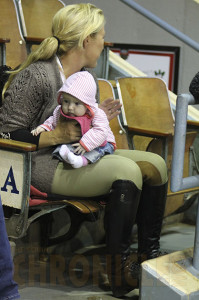New Research Shows Equine-Assisted Intervention Can Have Significant Improvement on Mother-Child Relationship
 Recently published research from University of Rostock, Germany indicates that implementing an Equine-Assisted Intervention as an early approach to improve mother-child relationship and interaction for children with attachment disorders was successful.
Recently published research from University of Rostock, Germany indicates that implementing an Equine-Assisted Intervention as an early approach to improve mother-child relationship and interaction for children with attachment disorders was successful.
Horses and Humans Research Foundation, a publicly funded international foundation based in Chagrin Falls, Ohio, awarded funding to the Department of Special Education, University of Rostock, Germany and lead investigator Andrea M. Beetz, PhD to determine whether equine-assisted activities can help insecurely attached children and their caregiver or therapist to engage in a more secure and trusting relationship than they had before. The study explored whether these dyads, who have a history of neglect and/or abuse, will open up easier to their therapists after equine-assisted activities in comparison to play therapy.
Insecure attachment, both of the child and of the mother, has been identified as a risk factor for early regulation disorders and further child development. During the study, both interventions (equine-assisted activities and play therapy) took place once a week for 45 minutes over a period of 8 weeks and aimed at improving maternal caregiving and security in the mother-child relationship. Twenty mother-child dyads (children aged 12 to 24 months) from a high-risk background, in some of which the child already displayed dysregulation symptoms, were investigated. Attachment of mother and child, maternal caregiving, and interaction within the dyad were assessed before and after the intervention. Overall both approaches led to significant improvements in mother–child relationship and interaction, both having specific advantages over the other. When given the choice, the majority of mothers would prefer EAI, which points to a potential motivational effect.
This research was published in Volume 8, Issue 1, 2015 of the Journal of Occupational Therapy, Schools and Early Intervention.
Horses and Humans Research Foundation is the only organization dedicated solely to funding research to support the equine-assisted activities and therapies field. Since its founding, HHRF has awarded $400,000 in professional research efforts led by eight research teams in the United States, Canada and Germany.
To make a donation and/or learn more about this and other Horses and Humans Research Foundation projects please email info@horsesandhumans.org or visit http://www.horsesandhumans.org.










